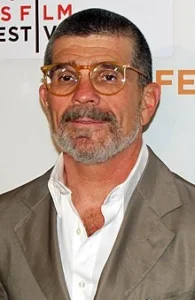
David Mamet
David Mamet, born on November 30, 1947, in Chicago, Illinois, is an acclaimed American playwright, screenwriter, and director, renowned for his distinctive writing style and contribution to the theater and film industry. A graduate of Goddard College in Vermont, Mamet's career skyrocketed with the success of his play "Sexual Perversity in Chicago" (1974). He gained widespread recognition for "Glengarry Glen Ross" (1984), a Pulitzer Prize-winning play that masterfully depicted the cutthroat world of real estate salesmen. Mamet's signature style, marked by brisk, rhythmic dialogue, often called "Mamet speak," reflects his fascination with the rhythm and patterns of speech. His foray into cinema includes screenplays for films like "The Postman Always Rings Twice" (1981) and "The Verdict" (1982). He has also directed films such as "House of Games" (1987) and "The Spanish Prisoner" (1997). A multifaceted artist, Mamet's work spans various genres, showcasing his versatility and deep understanding of human nature and societal constructs. His contributions to both stage and screen have cemented his status as a pivotal figure in contemporary American drama and cinema.
Books Mentioned on The Joe Rogan Experience (JRE) #1801 - Joe Rogan & David Mamet:
David Mamet on the Current State of Hollywood: A Conversation with Joe Rogan
David Mamet, a renowned playwright, screenwriter, and filmmaker, discussed the dramatic changes he has witnessed in the Hollywood landscape during his appearance on “The Joe Rogan Experience #1801.” Mamet, who began his career in Hollywood around 1979, reminisced about the early days when Hollywood was much closer to its inception. He recalled his interactions with figures like Samson Rayfelson, a testament to how close he was to the roots of Hollywood.
Mamet nostalgically spoke about the era when independent films thrived. He described a time when filmmakers could easily secure funding with just a good script and a modest budget. This era of creative freedom and independence, however, according to Mamet, no longer exists in today’s Hollywood.
The Decline of Movie Magic and the Rise of Corporate Influence
The conversation then shifted to the decline of the traditional movie-going experience. Mamet lamented the loss of the magic associated with watching larger-than-life figures on the big screen, an experience often shared with friends or loved ones while enjoying popcorn in a dark theater. This classic scenario has been replaced by movies being consumed on small personal devices, leading to a significant shift in the industry.
Mamet pointed out how movie-making has become highly corporate, with decisions no longer being made by individual visionaries but rather by committees and corporate boards. This shift has resulted in a lack of originality and creativity, as decisions are driven more by corporate interests and less by artistic vision.
The Bottleneck of Film Production and the Shift in Distribution
Mamet identified the major bottleneck in film production as the control of distribution by large corporations. He noted that the method of distribution heavily influences the content and style of films being produced. The rise of streaming services and the decline of traditional movie theaters have dramatically changed the landscape, with companies like Netflix becoming the primary source of movies for many viewers.
The conversation also touched on the financial aspects of filmmaking, with Mamet emphasizing that the expense of film production often dictates the kind of movies that get made. The result is a safer, more formulaic approach to filmmaking, with less room for creative risks.
The Changing Landscape and the Future of Independent Films
Despite the challenges, Mamet acknowledged that independent films are still being made, although the process and avenues for their production and distribution have changed. He expressed uncertainty about the future of these films in the current Hollywood ecosystem.
Overall, Mamet’s conversation with Joe Rogan painted a picture of a Hollywood that has undergone profound changes over the decades. While reminiscing about the past, Mamet also expressed a clear understanding of the realities of the present film industry, marked by corporate control and changing distribution methods. His insights offer a valuable perspective on the evolution of filmmaking and the challenges faced by artists in the modern era.












